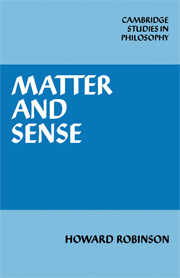Book contents
- Frontmatter
- Contents
- Acknowledgments
- 1 The materialist's problem and some non-reductive solutions
- 2 Supervenience and reduction
- 3 Behaviourism and stimulus materialism
- 4 The causal theory of mind
- 5 The disappearance theory
- 6 Reductive theories of perception
- 7 Matter: turning the tables
- Conclusion
- References
- Index
3 - Behaviourism and stimulus materialism
Published online by Cambridge University Press: 07 May 2010
- Frontmatter
- Contents
- Acknowledgments
- 1 The materialist's problem and some non-reductive solutions
- 2 Supervenience and reduction
- 3 Behaviourism and stimulus materialism
- 4 The causal theory of mind
- 5 The disappearance theory
- 6 Reductive theories of perception
- 7 Matter: turning the tables
- Conclusion
- References
- Index
Summary
BEHAVIOURISM, DISPOSITIONS AND PHYSICALISM
The failure of non-reductive forms of materialism leads us to consider reductive theories. The most popular contemporary versions of reductive materialism, namely the central state theories of Smart and Armstrong, were developed in response to the inadequacies of behaviourism. They also retained important behaviouristic components. So it is natural to begin our discussion by plotting the logical paths which have led from behaviourism to central state materialism.
According to the most naive formulation of behaviourism, to be in a certain mental state is to be behaving in some supposedly appropriate way. Thus, to be in pain is to be pain-behaving. The inadequacies of such a naive approach were always apparent: overt behaviour is neither necessary nor sufficient for possession of the mental state. Some people can suffer pain and repress the normal behavioural response others – for example actors – might exhibit the behaviour when they lack the pain. Behaviourists have tended to adopt either of two possible modifications to the theory to meet this problem. We shall see that both responses point towards central state materialism. The first modification, and the more popular one among philosophers, is to identify a mental state with the disposition towards behaviour, rather than with the behaviour itself. The first problem with this theory is to explain what one means by ‘disposition’. Ryle (1949) popularised this general approach to the philosophy of mind and he interpreted ‘disposition’ in a non-realist (sometimes called ‘phenomenalist’) sense. For Ryle, to say that s has a disposition to Ø is to say that he has Ød, is Øing, will Ø or would Ø in certain specified appropriate circumstances.
- Type
- Chapter
- Information
- Matter and SenseA Critique of Contemporary Materialism, pp. 35 - 50Publisher: Cambridge University PressPrint publication year: 1982



